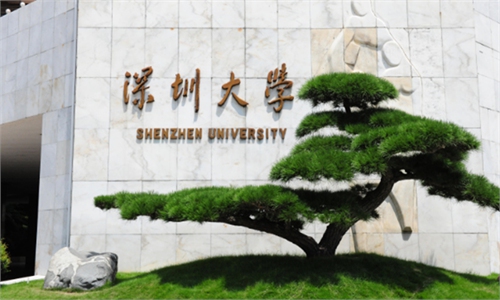
A bridge over the Zhanjiang River, undertaken by the China Railway Major Bridge Engineering Group, is successfully completed on Monday. The 9.36-kilometer bridge is a key project in South China's Guangdong Province, and will strengthen connectivity within the province, as well as the Guangdong-Hong Kong-Macau Greater Bay Area. It will be a key development project to boost local economic growth. Photo: Xinhua
More Hong Kong professionals, ranging from young entrepreneurs to middle-aged academics, are choosing to pursue their careers in the Chinese mainland, whether starting a business or working for mainland companies and institutions, as they are aware of the mainland's huge market, Hong Kong entrepreneurs and experts told the Global Times.
Such a trend shows the integration and mutual appeal of resources in Hong Kong and the mainland, despite setbacks such as the pandemic, which cut Hong Kong-mainland travel, as well as the Hong Kong riots that broke out in 2019.
"After multiple years of entrepreneurship in Shenzhen, I'm keenly aware of the city's development and changes as it's been striving to build a more open environment … to open a window for Hong Kong young people to develop a career path or start businesses in the mainland," Kris Tsang, who founded co-working space firm "708090" in Shenzhen, told the Global Times.
Considering Shenzhen as an opportunity enabler to relieve social conflict in Hong Kong, a city known for small homes, high living costs and intense competitive pressure, Tsang said many Hong Kong professionals in the financial, legal and technology spheres are welcome to work and live in Shenzhen, underpinned by continued deregulation moves, where they can flex their muscles and inject vitality into the city's development.
Thomas Yeung, vice dean of the Futian School of Finance and an economist in Hong Kong, told the Global Times that many Hong Kong professionals are working in the mainland.
"More than 70 percent of my acquaintances are engaged in professions related to the mainland, such as being senior executives in large mainland companies, teaching in mainland universities and schools, or starting their own businesses in high-tech industries," he told the Global Times on Wednesday.
He said that Hong Kong residents particularly take a fancy to mainland markets' development opportunities and the living environment, but they also have certain concerns such as neighborhood relations and education for their children.
Moves to the mainland by Hong Kong professionals for jobs and opportunities follow actions by local governments in the mainland, particularly those in the Guangdong-Hong Kong-Macao Greater Bay Area (GBA), to roll out a flurry of favorable policies for Hong Kong residents in recent years.
Noel Shih, chairman of the Young Democratic Alliance for the Betterment and Progress of Hong Kong, told the Global Times that youth innovation and entrepreneurship bases in the GBA have been rapidly growing in recent years, and the Guangdong provincial government has ramped up efforts to build innovation and entrepreneurship bases for Hong Kong and Macao youth since 2019, creating a favorable working and living environment for them.
For Hong Kong youth who aspire to start businesses in the mainland, the GBA will offer preferential policies and measures announced by municipal governments within the region, as well as incubating and tutoring services, reducing risks associated with start-ups, according to Shih.
Currently, those policies cover a wide range of areas from specific subsidies to tax cuts. For example, high-level Hong Kong professionals only need to pay 15 percent of their tax assessments in the GBA. The rest is paid by relevant local governments in the area in the form of subsidies.
In addition to the GBA, Beijing - a vibrant cultural hub where there are a good number of famed universities - has become increasingly appealing to Hong Kong's youth to achieve mainland successes.
Some Hong Kong students entering universities in Beijing have opted to work in the capital city after graduation, and some students hailing from Hong Kong, after working for a short while, pursue their own entrepreneurial projects, John Leung, director of the Office of the Government of the Hong Kong Special Administrative Region in Beijing, told the Global Times.
The office has assisted these students in finding internships and jobs, Leung said, noting that Zhongguancun, Beijing's innovative hub, has a supportive facility to help young people from Hong Kong and Macao turn their entrepreneurial ideas into business successes.
Wesley Leung, founder of a cultural start-up named Beijing Sun Moon Star Qi Cultural Communication, said he enjoys tangible benefits from participating in favorable projects for entrepreneurs in Beijing, including projects by the Zhongguancun Beijing-Hong Kong-Macao Youth Innovation Center and Beijing's Chaoyang District.
Citing the design of cultural and creative products, Leung said designers from Hong Kong have global visions and tastes, so their designs cater to the international market.
"But the cultural industry has a long development cycle. That's why I came to Beijing, which is the highland of versatile talent as well as the cultural center of China," he told the Global Times.
Lin Jiang, a professor of economics at Lingnan University College of Sun Yat-sen University, said that Hong Kong professionals are attracted by the mainland's huge market. Some high-tech start-ups, like those involving drones, would face difficulties in securing investment in Hong Kong, whereas the mainland's huge market could give them chances to grow.
However, he pointed out that compared with Hong Kong professionals who come to work in the mainland, the number of Hong Kong residents who start businesses in the mainland remains limited.
"Hong Kong young people have complicated feelings about entrepreneurship in the mainland. They have great expectations for the GBA, but at the same time they are not familiar with the mainland environment, including laws and social conditions, which makes them hesitant about starting businesses in the mainland, " Lin said.




